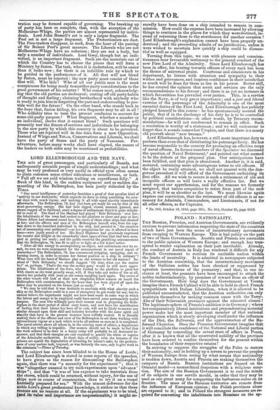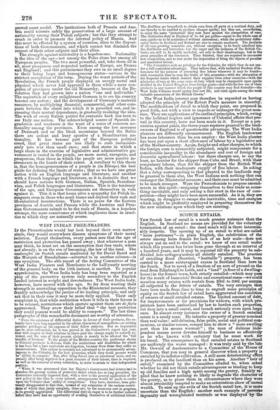POLAND: NATIONALITY.
THE Russian, Prussian, and Austrian Governments, are evidently anxious to prevent information respecting the state of the countries which have just been the scene of insurrectionary movements from escaping to Western Europe. This is bad policy on the part of two of these Governments. Austria and Prussia are amenable to the public opinion of Western Europe; and enough has tran- spired to render explanation on their part inevitable. Already, the conduct of Austria in Italy has rendered it difficult for any French Government to restrain its excitable nation within the limits of neutrality. It is admitted in newspapers subjected to the Austrian censorship, that the insurrectionary movement of the Gallician nobles has been checked or suppressed by agrarian insurrections of the peasantry; and that, in one in- stance at least, the peasants have been encouraged to attack the nobles indiscriminately, by promises of reward from an officer of the Government. How long does the Government at Vienna imagine that a French Cabinet will be able to hold in check French sympathizers with Italian Liberalism, when it is allowed to be published uncontradicted, that the Austrian authorities can only maintain themselves by making common cause with the Terry Alts of their Sclavonian provinces against the educated classes The legitimate sphere of Prussia's ambition is in Germany ; where her comparatively liberal institutions and preponderating material power make her the most important member of that national organization which is slowly developing itself under the influence of the Diet, the Zollverein, and the approximation of the
l
formed Churches. Does the Prussian Government imagine tittrt it will conciliate the confidence of the National and Liberal parties of Germany by concealing the actual state of affairs in Posen, after it is known that all the unarrested nobility of the province have been ordered to confine themselves for the present within the boundaries of their respective estates ? In striving to suppress the struggles of the Poles to restore their nationality, and in holding up a screen to prevent the peoples of Western Europe from seeing by what means that nationality is trodden down, Austria and Prussia are making themselves the catspaws of Russia. Russian institutions are framed on the Oriental model—a monarchical despotism with a religious sanc- tion. The aim of the Russian Government is to cast the minds of its subjects in one servile mould, in order that they may be used as one great army for conquering the barbarous states on its frontier. The mass of the Russian territories are remote from the influence of European opinionS the Polish provinces alone are exposed to it and in Poland the strongest measures are re- quired for converting the inhabitants into Russians on the ap-
_proved court model. The institutions both of Prussia and Aus- tria could tolerate safely the preservation of a large amount of nationality among their Polish subjects ; but this they attempt to crush in order to promote the internal policy of Russia. And this must be effected by a system of coercion, alien to the disposi- tions of both Governments, and which cannot but diminish the respect of their other subjects and their allies. The struggle against nationality is a hopeless one. Nationality is the idea of the age—not among the Poles alone but among all
'European peoples. The two most powerful, and, take them all in all, most prosperous and respected nations of Europe, are France and England ; and this preeminence they owe in no small degree to their being large and homogeneous states—nations in the strictest acceptation of the term. During the worst periods of the Revolution, the French people displayed an energy moral and physical which never had appeared in them while a mere con- geries of provinces under the old Monarchy, because at the Re- volution they had grown into a nation "one and indivisible." 'The aspiration of every enlightened German is to see his country become one nation ; and the development of Germany's material resources, by multiplying financial, commercial, and other com- pacts between the states into which it is parcelled out, and in- creasing their mutual dependence, is gradually realizing the idea. The wish of every Italian patriot for centuries back has been to see Italy one nation. The acknowledged source of Spanish de- gradation and weakness is the want of a sense of common na- tionality among the provinces. Even among the low morasses of Denmark and on the bleak mountains beyond the Baltic there are ardent and busy apostles of a Scandinavian na- tionality. It has become part of the European political creed, that great states are less likely to rush inconsider- ately into war than small ones ; and that states in which a large share in the exercise of legislative and administrative go- vernment is vested in the people, are more moral, energetic, and prosperous, than those in which the people are mere passive in- atruments in the hands of their rulers. A corollary to this thesis is, that the homogeneousness of a people is (in Europe) the best guide for defining the limits of states; that as we have one great nation with an -English language and literature, and another 'with a French language and literature, so it is desirable that we should have nations with German, Italian, Spanish, Scandina- vian, and Polish languages and literatures. This is the tendency of the age, and European Governments set themselves in vain against it. This it is that keeps alive a sympathy for Polish in- surgents even in those who must blame and deplore their rash and -ill-calculated insurrections. There is no peace for the Eastern provinces of Austria and Prussia while the Austrian and Prus- sian Governments submit to be the tools of Russia, in a hopeless attempt, the mere connivance at which implicates them in cruel- ties to which they are naturally averse.



























 Previous page
Previous page